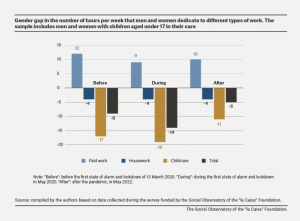Gender gap in household duties has been reduced after the Covid-19 pandemic
 The study “Gender inequality in paid and unpaid work after the pandemic” co-authored by our researcher Lídia Farré and Libertad González for “laCaixa” Foundation reveals that the COVID-19 pandemic has had significant effects on gender equality, particularly in terms of women’s employment and domestic responsibilities.
The study “Gender inequality in paid and unpaid work after the pandemic” co-authored by our researcher Lídia Farré and Libertad González for “laCaixa” Foundation reveals that the COVID-19 pandemic has had significant effects on gender equality, particularly in terms of women’s employment and domestic responsibilities.
The closure of businesses and schools during the pandemic led to a significant increase in unpaid work for women, with men’s involvement in childcare remaining low. However, a recent study conducted in Spain has shown that two years after the first lockdown, the gender gap in total weekly working hours, including paid and unpaid work, has narrowed.
This reduction is mainly due to men’s increased involvement in childcare during the pandemic, resulting in a more equal sharing of tasks within the household. While women still dedicate more time to unpaid work and childcare, the study suggests that men’s increased participation in childcare during lockdown could contribute to a more equal distribution of family responsibilities in the long term.
Recent news
- Four Researchers from the UB School of Economics awarded by the State Research Agency
- 24 Researchers join the UB School of Economics in 2023 and early 2024
- The 5centims.cat blog presents its article 250 at the faculty of Economics and Business
- "A Multidisciplinary Approach Is Essential for Understanding Poverty Dynamics and Economic Policies"
- Two UB School of Economics PhD Students awarded with SEBAP Mobility Grants
- Apply for the PhD in Economics with entry funding opportunities for 2024-2025 academic year
- AGAUR Awards Grant to UB School of Economics for Climate Change Research
- The UB improves positions and is listed among the top 100 universities worldwide in the Webometrics ranking
- Citizens would only give up free elections in exchange for a threefold increase in income, according to research by the UB

Sorry, the comment form is closed at this time.